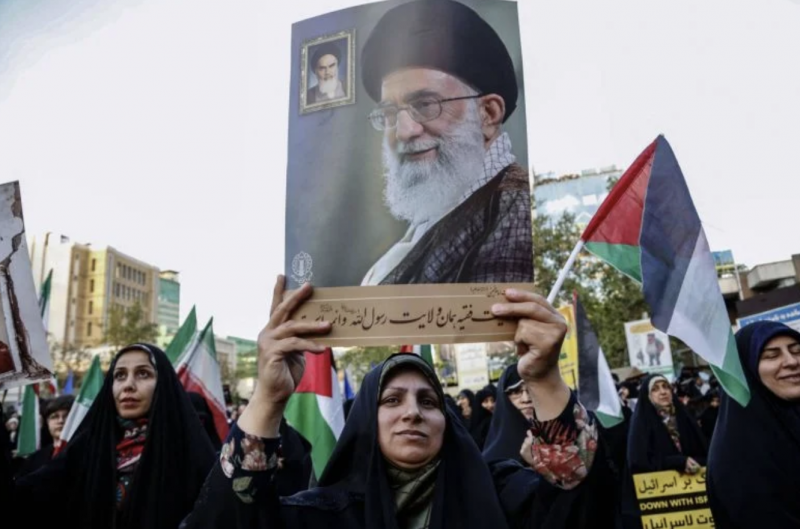
Iranian women hold up portraits of Supreme Leader Ali Khamenei and Palestinian and Iranian flags to celebrate Tehran's retaliation against Israel, in the Iranian capital's Palestine Square, April 15, 2024. (Credit: Atta Kenare/AFP)
By opting to strike Israel, Iran has broken with a strategy that had been the cornerstone of its security policy for decades.
Israeli intelligence did not anticipate this decision when Tel Aviv attacked Iran’s consular annex building in Damascus on April 1. It was the result of heated debate in decision-making circles in Iran, L’Orient-Le Jour learned from several sources within the “Axis of Resistance.”
Iran’s Ministry of Foreign Affairs recommended a diplomatic approach to avoid falling into the Israeli trap. But the Pasdaran, who were directly affected by the Israeli strike in Syria, wanted to respond firmly to reinforce Iran’s deterrence.
L’Orient-Le Jour learned that, at the Supreme National Security Council’s first meeting, the Foreign Affairs Minister Hossein Amir-Abdollahian emerged as an ardent supporter of the “strategic patience” policy adopted by Iran in recent years as part of the shadow war against Israel.
Amir-Abdollahian reportedly feared that Israeli Prime Minister Benjamin Netanyahu would take advantage of an Iranian retaliation to extend the Gaza war to the region, possibly even involving the US, and to turn world opinion against Iran.
Proponents of this line advised that the response should be led by Iran’s allies in the region, through simultaneous operations on different fronts.
Negotiations of last resort
This option is in line with Iran’s position since Oct. 7. Tehran, — which claims not to have been informed of Hamas’s attack — has until now considered that it was better not to get directly involved in the war, to avoid confrontation with the US. In addition, the Iranian regime wanted to avoid giving fodder for its enemies’ arguments that Hamas had acted in line with Iranian objectives.
In their opinion, this would have distracted attention from the Palestinian cause, dampened sympathy for Hamas and made Israel look like the victim of the Palestinian faction and its Iranian sponsor.
Frustrated by the laissez-faire implicit attitude toward Israel, the hard-liner wing of the Iranian regime nonetheless demanded a strong and decisive response., Negotiations were conducted between Tehran and Washington through various channels, in parallel to this renewed debate within the Iranian establishment more than six months after the start of the war in Gaza
s, Iran said it is ready to abandon any desire to retaliate, in exchange for a halt to hostilities in the Palestinian enclave, the resumption of nuclear talks, measures to lift sanctions and a guarantee that Israel will no longer target Iranian citizens, the sources said.
The US rejected the proposals, insisting that Iran exert pressure on Hamas to release the hostages still held in Gaza and agree to the proposed temporary cease-fire.
Additionally, the US demanded that Hezbollah withdraw north of the Litani River and cease its operations against Israel, pending the establishment of new rules of engagement to ensure the protection of Israelis.
However, Tehran rebuffed these demands, prompting Supreme Leader Ali Khamenei to issue a strong response against Israel.
Diplomatic hardline
This decision echoes the line taken by the supporters of a decisive and direct response from Iran, which sought to send a powerful message to deter any future attacks akin to the one in Damascus.
Iran’s Islamic Revolutionary Guard Corps (IRGC) and the religious establishment were adamant about striking at the core of Israel. The aim was to assert Iran's readiness to engage in conflict and to underscore that assaults on Iranian interests and personnel would not be left unchallenged.
The IRGC said it’s imperative to robustly retaliate to every Israeli operation, aiming to reclaim Iran's "dignity" and exhibit unwavering resolve.
This message is significant for Iranians and the forces within the “Axis of Resistance”. It came at a juncture when discontent was mounting among pro-Iranian factions in the region, stemming from Tehran's reluctance to escalate its confrontation with Israel.
By unleashing over 300 drones and missiles into Israel on Saturday evening, Khamenei deliberately conveyed a resounding message to all adversaries, signaling a paradigm shift in Iran's approach.
However, alongside this meticulously measured retaliation, which resulted in only one significant injury, Iran pursued diplomatic channels to maintain the sequence of events. Tehran urged the US to pressure its Israeli ally into halting the counter-attacks and de-escalating the situation.
The Swiss embassy in Tehran relayed these communications, serving as the intermediary for American interests due to the absence of bilateral diplomatic relations.
The Swiss envoy was summoned by authorities the day after the attack on Israel. They found themselves confronting the IRGC, the architects of the response, rather than their customary counterparts from the Foreign Ministry.
Washington conveyed messages to Tehran emphasizing its ongoing efforts to avert an Israeli response that could spiral into regional escalation. Israel remained steadfast in its stance that retaliation was inevitable.
Based on L’Orient-Le Jour’s sources, Tehran informed the US that following this strike, any Israeli operation targeting Iran or its interests would elicit an immediate, forceful and swift retaliation from Iran, abandoning any notion of "strategic patience."
Unlike the announced retaliation on Saturday, this time Iran is likely to unleash a surprise element, even if it precipitates open warfare.
This article was originally published in L'Orient-Le Jour. Translated by Sahar Ghoussoub.